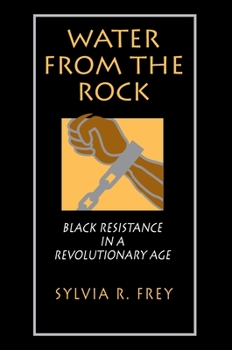Water from the Rock: Black Resistance in a Revolutionary Age
Select Format
Select Condition 
Book Overview
The era of the American Revolution was one of violent and unpredictable social, economic, and political change, and the dislocations of the period were most severely felt in the South. Sylvia Frey contends that the military struggle there involved a triangle--two sets of white belligerents and approximately 400,000 slaves. She reveals the dialectical relationships between slave resistance and Britain's Southern Strategy and between slave resistance...
Format:Paperback
Language:English
ISBN:0691006261
ISBN13:9780691006260
Release Date:January 1992
Publisher:Princeton University Press
Length:376 Pages
Weight:1.29 lbs.
Dimensions:1.0" x 6.1" x 9.2"
Customer Reviews
2 ratings
Comprehensive, with a heck of a bibliography
Published by Thriftbooks.com User , 23 years ago
In no way is this an attempt to augment Geoffrey's excellent review of this text, for I believe that he hit upon the major strenghts of Frey's book. However, it is worth mentioning, for the sake of those scholars that take particular notice of the bibliograhys, that Frey's research seems particularly solid, having used sources that generally are not considered on this side of the Atlantic when considering the American Revolutionary War. Most notable of these are public war records from Great Britain, which help give a more full understanding of the role of African "Americans" within the Revolutionary War.In all, Frey's text is a solid and comprehensive study with some minor, yet somewhat forgivable flaws. For example, despite the presence of slaves in areas such as Pennsylvania and New York, Frey ignores everying in America north of Maryland (with the exception of some slave relocations in Novia Scotia). Furthermore, her presumptions of a present republican ideology seems somewhat misplaced at times, but generally, these are minors flaws in an otherwise compelling argument. A certain recomendation!
The black liberation movement during and after the Amer Rev.
Published by Thriftbooks.com User , 26 years ago
Frey argues that the black liberation movement had a major impact on how the Revolution played out in the South and that although the movement failed during the Revolution it successfully continued in the postwar period as a struggle for cultural power.The South represented the best opportunity the British had for success because of the large Loyalist population. However, accomplishing what the Rebels could not, the British caused the white population of the South to stand against a common enemy by badly misplaying the slavery issue. The Pre-Revolution Southern economy was based on labor intensive staple crops (tobacco, rice, and indigo) which required slave labor to be successful. So much labor was required that in many areas of the South the slave population outnumbered the white population. Consequently, Southerners greatly feared slave revolt. Although the British did not make it official policy, they gave the appearance of being sympathetic to slaves (particularly Clinton's policy of limited emancipation). This tactic frightened the white Southerners and encouraged thousands of slaves to flee their plantations creating economic hardship for the plantation owners. Some slaves fled into the wilderness, while others fled to the British Army and were either incorporated into the army, or at least traveled with the army. This British policy, or non-policy, pushed the white Southerners to independence. Ironically, American independence resulted in continued slavery for blacks and an increase in racial tensions. The Southerners, still outnumbered by slaves which they were feverishly importing to rebuild their plantations, and with the fear of slave revolts fresh in their minds, passed laws that divided the races, dealt harshly with any slave that stepped out of line, and specifically disenfranchised free blacks.The black liberation movement continued as a struggle for cultural power within the context of religion. Evangelical religion did not become accepted in the South until its pr! eachers dropped the anti-slavery rhetoric. But, these Southern Baptist and Southern Methodist preachers didn't just ignore slavery, they preached that Christianity condoned slavery. They were allowed to preach to slaves because their message was that the slave's religious duty was to obey his master. While a great many slaves converted to Christianity, their interpretation of Christian theology and morality differed from that of white Southerners. Afro-Christianity, the black church movement, began before the Revolution and was the center of cultural, ethnic, and community identity. In the church, they were something other than "someone's property." Although whites attempted to squash the movement after the great Vesey Plot of 1822, Afro-Christianity had already spread as far away as Kentucky. Afro-Christianity incorporated African cultural elements into Christianity and unified and organized the black community. The white Southerners had hoped tha






